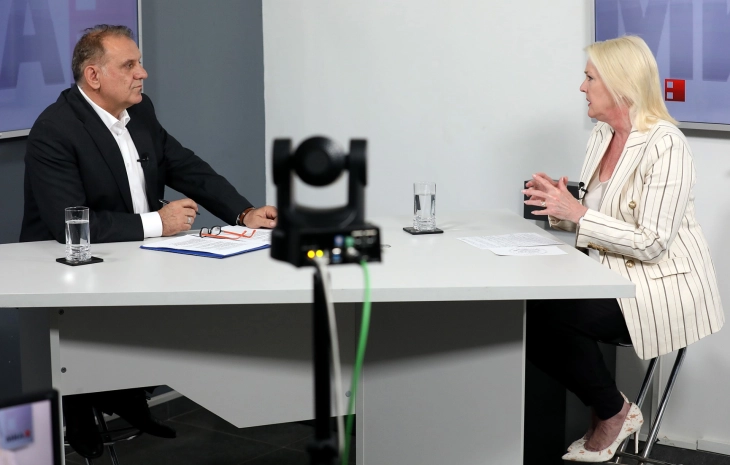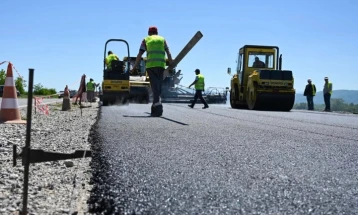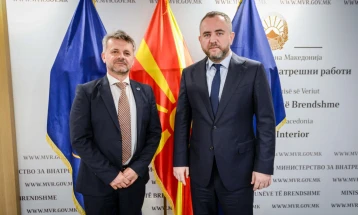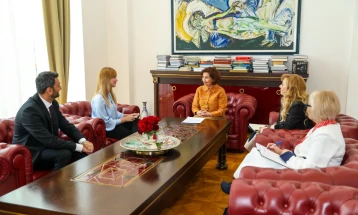North Macedonia one of leaders in region regarding media landscape, says Aggeler
- There are concerns but there are also improvements, North Macedonia is one of the leaders in the region regarding the media landscape, says United States Ambassador Angela Aggeler in an interview with MIA when asked to make a comparison from a decade ago, when she served at the U.S. Embassy under then-ambassador Phillip Reeker.
- Post By Ivan Kolekevski
- 12:45, 19 May, 2023

Skopje, 19 May 2023 (MIA) - There are concerns but there are also improvements, North Macedonia is one of the leaders in the region regarding the media landscape, says United States Ambassador Angela Aggeler in an interview with MIA when asked to make a comparison from a decade ago, when she served at the U.S. Embassy under then-ambassador Phillip Reeker.
"It’s been interesting to me to speak with journalists-friends who were here and who were there before, like you, and one thing that I applaud from 10-12 years ago was the courage and commitment of people like you and other colleagues to bring about those reforms. Today I know there is a great deal of concern about the fact that the number of young people that are applying for journalism school is dropping, that there is enormous pressure on the media. Frankly, this is the case globally. You see this in the United States because the landscapes have changed and the economics of media has changed. So, some of the assumptions that we could have safely made 12 years ago are no longer the same. But there have been a few bright spots in terms of Reporters without Borders still cites concerns, Transparency International has cited an increase and shows North Macedonia as one of the leaders in the region. But there are enormous challenges," says Ambassador Aggeler.
She adds that part of the reason why young people are not applying to study journalism in North Macedonia is because many of them are leaving to seek opportunities elsewhere.
"I hope that the important role that the media plays, through ZNM and other organizations, is to continue to shine the light on truth and what is actually happening within the country and how that affects its citizens. I think there is a great role that continues to be crucially important for organizations like that," says Aggeler.
On countering disinformation and fake news, the U.S. Ambassador highlights the importance of media literacy, so that citizens can try to understand what is real and what is not.
"That is a very important question, As you know, we had our coordinator from the Global Engagement Center who was here recently to specifically talk to leadership and journalists about disinformation and the role of malign actors, as we call them, within the media. We know that Russia plays a malign role in terms of disinformation, misinformation, lack of information, and seeking to negatively affect the environment. What you say, and this is something that we have talked about a number of times, is the importance of media literacy, so that the consumers of this show or whatever they see online, citizens of the country can try to understand what is real and what is not real, and to ask the hard questions. Too often what we see is proxies used by those malign actors who seek to create chaos. They don’t want to have an orderly conversation about facts, they want to sow chaos within the country," says Aggeler.
A great example of this, she adds, was the bomb threats reported in schools around the country.
"That frightened parents, frightened students and had a negative effect. Our understanding is that sometimes it is very targeted, other times these malign actors are just taking advantage of situation of uncertainty and working to make it worse. We work very closely with media organizations and the government to help try to identify disinformation and what we can do help target it ourselves," says Aggeler.
Regarding the impression that media are more engaged in detecting corruption and crime and do most of the work rather than the institutions, she says it is part of the journalists' work to ask the hard questions.
"I think this is a very important question and I’ve heard that a lot, journalists saying ‘why is this my job now’. Well, it is your job. Part of the journalists’ work is to ask the hard questions. There are very good investigative journalists in this country. You are one of them, you’ve asked leaders and others very hard questions over the years, and that is the important role of the media. However, it does not substitute for the requirements for those involved in investigating and prosecuting crimes. There is a role for the police, there is a role for prosecutors, there is a role for defense attorneys and there is a role for the judges. Everybody has to do their job for this to work. I think the role of media in this is absolutely critical but that doesn’t replace the need for those within the judiciary who are responsible for prosecuting crimes to do so," notes Aggeler in the interview.







